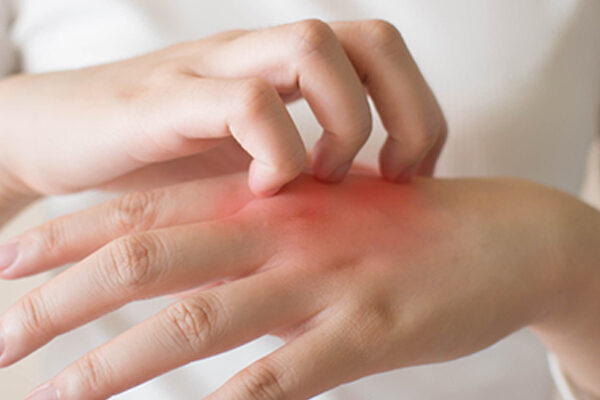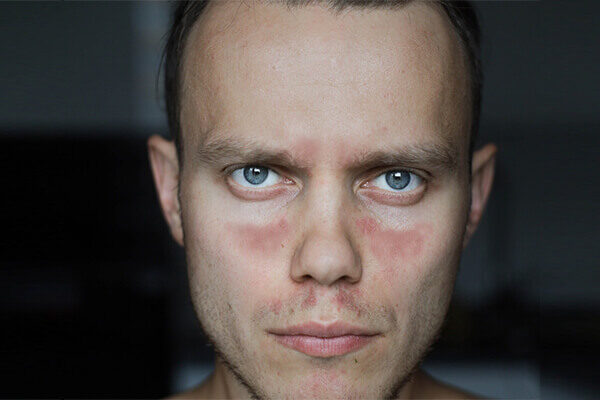Updated on December 16, 2022
Overview:
Urticaria is a common skin condition that is also popular as Hives. It commonly presents as pruritic, raised, erythematous plaques, with pallor and lesions of varying size and shapes. The global prevalence of urticaria is 86 million people. It has a female preponderance and affects women of age 20 to 40 years. Urticaria occurs in various forms; urticaria multiforme is one of them. It is a subtype of urticaria also called acute annular urticaria. This type of urticaria is usually known to affect children under 3 years of age.
In this blog, we will be focusing on urticaria multiforme symptoms, what are urticaria multiforme treatment options, and urticaria multiforme pediatrics.
The Origins of Urticaria:
William Cullen coined the name “urticaria” in the 18th century, derived from the stinging herb urtica urens. Today, urticaria is thought to be a collection of illnesses that are usually classified as acute, ongoing, unrestrained, or triggered by evoking stimuli.
What Happens In Urticaria Multiforme?
Urticaria multiforme is an acute annular urticaria which is an allergic hypersensitivity reaction. It is mediated by histamines. They may be IgE-dependent or independent. The lesions of urticaria multiforme are annular or polycyclic, which blanch on applying pressure and display a purplish or dark hue.
Clinical Presentation of Urticaria Multiforme
- Ecchymotic centers or central clearing in violaceous, polycyclic, annular wheals that are itchy.
- Each lesion is distinct, even though the condition may linger for days to weeks.
- Mild systemic symptoms may include low-grade fever, face edema, or acral edema, dermatographism.
Urticaria multiforme may leave behind some purpura or post-inflammatory hyperpigmentation, whereas urticaria cures without leaving behind any lingering ecchymotic markings on the skin.
Urticaria Multiforme Risk Factors:
Some of the risk factors are:
- Allergies,
- History of hives,
- Periodic viral infections,
- Medications,
- Emotional spurs, and
- Disorders like celiac disease, lupus, type 1 diabetes, and thyroid disease.
Diagnosis of Urticaria Multiforme:
Patients look innocuous on physical examination, and systemic symptoms are typically restricted to a brief period of mild fever (38°–39°C). A small percentage of patients show symptoms of a concurrent illness, such as cough or diarrhea during the course of the condition, despite the fact that many patients report having a pre-existing upper respiratory infection, otitis media, or viral symptoms including fatigue, body pains, or rhinitis.
Comprehensive laboratory tests and skin biopsies are not typically required in affected patients because the diagnosis of urticaria multiforme can be made on the basis of the patient’s medical history and physical examination.
How Urticaria Multiforme Can Be Distinguished From:
Multiform erythema:
These are targetoid lesions are fixed and can develop on the palms and soles. They are not itchy but are associated with discomfort and burning. They are frequently preceded by a viral infection, most frequently HSV.
Serum sickness-like reaction:
- Lesions are fixed,
- High fever, and
- Associated with myalgias, lymphadenopathy, and arthralgias.
Urticarial vasculitis:
- Lesions are firmly attached and painful, heal with hyperpigmentation,
- Associated with arthralgias, and
- More frequently affects adults with an illness-like response.
Urticaria Multiforme Pediatrics:
Urticaria multiforme affects newborns and young children. Large, annular urticarial plaques with a violaceous center are its defining feature, and fever is commonly present. Although this type of urticaria has a benign, self-limiting course, parents may become alarmed and quite anxious due to the lesions’ distinctive appearance.
Additional symptoms include:
- Fussiness,
- Dizziness,
- Swelling in hands, or feet, and
- Stinging sensation.
Urticaria Multiforme Pediatrics: Treatment Options:
The treatment of urticaria multiforme pediatrics depends on a variety of factors, including age, symptoms, and overall health status of a child. The best treatment of urticaria multiforme pediatrics is to stay cognizant of the triggers and try to avoid them as much as possible. Along with general precautions, the doctor may also prescribe anti-allergy to alleviate the symptoms, mainly itching.
Is it Contagious?
The rash cannot be transferred from one individual to another. It can spread if an infection is a source. The rash might not develop in everyone who contracts the virus, though.
Urticaria Multiforme Treatment:
Since episodes of urticaria multiforme typically go away on their own within two weeks, most patients just need symptomatic urticaria multiforme treatment. Any drugs that might be causing sickness should be stopped.
To provide the best symptom alleviation, the majority of patients need systemic medication with an H1 antihistamine, with or without an H2 antihistamine. The majority of the patients observe symptom resolution in 24 to 48 hours with combination therapy with oral antihistamines, according to research. Only the most severe instances that are resistant to combination antihistamine therapy should be treated with systemic corticosteroids.
Role of Revival Research In Urticaria Clinical Trials:
Revival Research Institute is conducting chronic spontaneous urticaria clinical trials in Michigan to study an investigational treatment that might be able to help people suffering from Urticaria. The aim is to provide people with enough understanding of their condition and a potential treatment option.
Outlook:
Although urticaria multiforme is typically treatable, occasionally the symptoms might get worse and lead to situations that are life-threatening. It is always better to keep an eye on your symptoms and know what triggers them so that they may be handled quickly to help reduce the discomfort.
Additionally, it may have a negative impact on one’s mental and emotional health. Therefore, if you find your mental health is suffering, it is advisable that you seek professional assistance. Understand that it is acceptable to speak with your psychologist in private about any issues you may have regarding the disease and how it affects your mental health.





